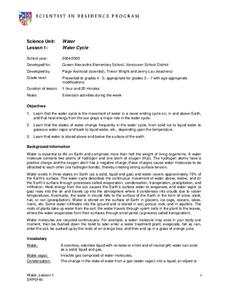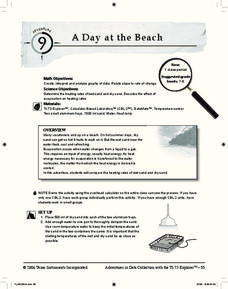Curated OER
It's Clean, Fresh and only Three Billion Years Old - Water!
Students engage in a lesson which explores the wate cycle. They get to see some very entertaining video, do fun hands-on activities and gain a better understanding of evaporation, condensation, precipitation and collection.
Curated OER
The Sun as the Driving Force of the Water Cycle
Learners study the water cycle and how the sun is an important factor. In this water cycle lesson plan students investigate how to desalinate water and explore the different densities of fresh versus saltwater.
Curated OER
Water Cycle
Young scientists explore Earth elements by conducting an experiment. They define water vocabulary terms such as condensation and precipitation. In addition, they conduct a water experiment in which they build a terrarium, so they can...
Curated OER
Rain On
Fourth graders study the water cycle and clouds. In this water cycle and cloud lesson, 4th graders determine the definition of condensation and watch a demonstration in which the teacher makes a cloud in a bottle. They discuss the water...
Curated OER
North Carolina Pottery
Students examine the process of evaporation. They observe how when clay dries, the water evaporates and how the weight of the object decreases. They complete a worksheet to complete the instructional activity.
Curated OER
The Prairie Climate
Ninth graders research the average temperature and precipitation of a prairie region to determine the type of climate it is, and how it differs from other biomes. They examine the types of adaptions animals have made to live in the...
Curated OER
A Day at the Beach
Help learners determine the rate of change for the temperature of sand. They will collect data on the temperature of wet and dry sand over time with a heat lamp overhead. Then make a scatter plot of the data and find a linear model to...
Curated OER
How Does Water Cool?
How fast does water cool? First fifth graders will draw a line on a graph that predicts how fast they think water can cool from boiling. Then they plot the actual data on the same graph to see if their estimate was correct.
Curated OER
A Honey of a Hexagon
Students explore how bees make honey and why the hexagon is the best basic pattern for the honeycomb through the use of a video and hands-on activities with honeycombs and geometric shapes.
Curated OER
Prairie Adaptations
Twelfth graders consider the survival of prairie plants. They examine how some tallgrass prairie species are adapted to the conditions of their ecosystem. They make a prediction of how a species might change given new conditions.
Curated OER
Behavior Of Substances At Different Temperatures
Fourth graders are involved in a lab experience to look at the concept of heating up various materials to see how they react to an increase in temperature. They make observations and record them in a lab journal. Then students discuss...
Curated OER
Exploring Phases of Matter
Students discuss and experiment with the phases of water. In this phases of matter lesson, students recognize the different states of matter. Students measure and record changes and understand when the state changes.
Curated OER
Intro to Civil Engineering and Hydrology
Students identify the processes involved in the water cycle. In this math lesson, students explain what civil engineers and hydrologist do. They watch a video about flooding in Texas.
Curated OER
How Does Your Garden Grow?
Students create a design for a school garden. In this garden design lesson plan, students analyze what plants grow best in their school's climate and work in teams to design a garden. Students measure the existing space, determine the...















